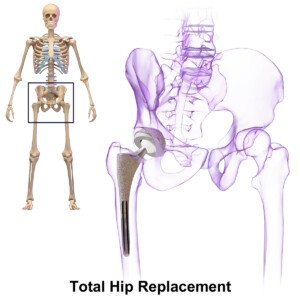
If you need hip fracture surgery (or replacement), you’re better off requesting regional anesthesia rather than general.
Many people don’t know that hip surgery can be performed with only regional anesthesia, and instead automatically assume that the patient must be “completely knocked out” in order to have this procedure. Not true at all.
My father had hip replacement surgery a few years ago and it seemed that anything less than general anesthesia was out of the question.
However, a study from the Perelman School of Medicine at the University of Pennsylvania concludes that regional presents a substantial reduction in mortality as well as pulmonary complications.
Twenty percent of hip fracture patients die within one year of injury, says Mark D. Neuman, MD, assistant professor of anesthesiology and critical care, and the study’s lead author.
The paper notes how common hip fractures are: 1.6 million a year worldwide, with most occurring in people over age 65. After age 80, mortality spikes.
Regional anesthesia may include epidural, spinal or a nerve block, while general has the patient unconscious; their nervous system is considerably depressed, such that they can’t even breathe on their own and must be intubated.
In this study, the patients who had hip fracture surgery with regional anesthesia had a 29 percent lower adjusted odds for mortality when compared to general anesthesia.
As for the decrease in adjusted odds for inpatient pulmonary complications, it was 24 percent with regional vs. general.
Being that hip fracture is such a global burden, these study results are not to be ignored.
These findings “highlight an important potential opportunity to improve outcomes among a growing population of vulnerable surgical patients,” says Lee A. Fleisher, MD, chair and Robert Dunning Dripps professor of anesthesiology and critical care.

BruceBlaus
If you’re concerned about breaking your hip bone when you’re “old,” there are things you can do to dramatically lower the chances of this happening.
If you don’t lift weights, then start.

Freepik.com
Strength training will strengthen bone by forcing muscles to pull against bone to generate joint action.
This stresses the bones and makes them adapt by becoming denser. Denser bones are less likely to break.











